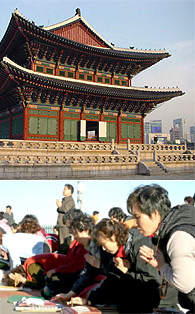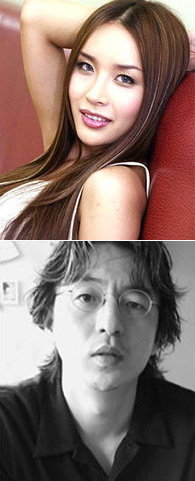Wednesday, November 23, was examination day in Korea. Students all over the country were writing the entrance examinations to get into universities.

Top pic: Geunjeongjeon building in Gyeongbokgung Palace in central Seoul with some of the modern city skyline in the background. Bottom: Parents praying for their children's academic success.
Wow. Talk about guilt levels if you fail! And how do you tell mom that you're gay after she has been praying for you for a hundred days?
I knew that Korea was a Confucian society, but this seemed a bit over the top. Particularly when a recent study of ten countries found that one fifth of Koreans say they have no belief in God. Only the French matched Korean atheism. A country of contrasts, we could say.
The Sex Museum
We came across the praying mothers on our way to the sex museum. When I asked our queer Korean hosts about the sex museum, no one had ever heard of the place. They all assumed that conservative Korea could not possibly have such an institution. But I am a pack-rat academic, and had a two-year old clipping from The Nation newspaper in Bangkok describing the place.
The article quoted the director as saying that he was so shocked by the low quality of the pornography that had become available in Korea on the Internet that he decided to show his collection to the public. This sex museum was established to counter pornography. Amazing!
A helpful lady in a tourist information booth diligently tracked down the museum for us. It had moved from its original auspicious location near the Palace of Shining Happiness - Changgyeonggung for short. To find the Erotic Art Museum we were told to go to Hyundai Department Store at Sinchon subway station.
I knew that all the big plush department stores in Japan had galleries and museums on top floors - but a sex museum in a hi-so department store? Doubts in hand, Arvind Narrain from India and I were on our way.
Two young ladies at the information counter in Hyundai Department Store spoke six words of English between them and had no clue about a sex museum. But they connected us to a helpful English-speaking voice on the telephone who told us to look for the museum in a park behind the Department Store, behind a statue of David.
Well, it wasn't in the park, and the park wasn't much of a park, so we wasted some more time finding David. And instead of white marble, he was solid gold. But we were there.
In the fourth floor of a modern building, was a spiffy-clean well-presented display of various prints, paintings and carvings mainly from China, Japan and Korea. The largest number of objects were slightly larger than life-size stone penises - in jade from China and a grey stone from Korea. Japanese prints showed huge, dark, gnarled penises and equally oversized vaginas. In contrast the Chinese prints showed penises that were tiny and white, with the delicate appearance of fine porcelain.
There were some depictions of lesbians, but almost nothing on gay men. When I introduced myself to the Director, Won Myung Ku, I mentioned that I was now living in Bangkok. He seemed surprised at this and asked if my wife was there too. "No wife," I said, "I'm gay." He seemed absolutely startled: "You're gay?" The head of the sex museum was acting as if he had never met a live gay man before. Arvind asked if there were many gays in Korea. "Many, many" he assured us - but it was not clear that he knew any of them.
I bought three ceramic penises for my collection. For the chairwoman of our meetings, Kim Vance from Canada, we purchased two small drinking cups in the shape of breasts. She had warned us not to bring her anything penis-like. With her sort-of-Korean name, we lovingly referred to her as Miss Kimchi - or as the great leader (Kim Il Sung).
The Speeches
The next day was work, starting with a presentation by the Secretary General of the National Human Rights Commission of Korea. This is the only commission in Asia with an express mandate to examine human rights issues associated with sexual orientation. And it has used its powers.

Top pic: Harisu, a famous transsexual pop singer, actress and model in Korea. Bottom: Huso Yi, who is one of the movers behind the Korean Sexual Minority Culture and Rights Center and the key link in getting local organisers in Seoul to take up the co-hosting of the dialogue.
Following the Secretary General's power point presentation came Fridae's own Doug Sanders, talking about the rest of Asia. Only a foreign academic would dare cover such a sweeping subject.
I started by taking law - half of Asia still has colonial-era anti homosexual criminal laws. A judge struck down the remaining discriminatory criminal laws in Hong Kong in August, finally bringing into force an equal age of consent for homosexual and heterosexual acts. Nothing has changed yet in South Asia or the formerly British parts of Southeast Asia. The Indian government has just filed a brief defending its 19th century law.
I then talked about media - the lack of open gay and lesbian magazines in all parts of Asia - except for Japan, Taiwan and Hong Kong. Government censorship has stopped the sale of even underground soft-core magazines in Thailand. The result has been the emergence of some 'fake gay' magazines, with models pretending to model clothes, while showing lots of flesh. A few pictures of ladies are inserted at the back, to make it clear that these are not gay magazines.
The LGBT magazines that existed in Korea - Buddy and Borizaru - have ceased publication. In part, of course, it is the rise of the Internet which has made print media optional at best.
Other speeches talked about the regional human rights systems and developments at the UN. Our discussions were focused on how to raise queer issues at the UN Commission on Human Rights. But the summit of world leaders that met at the UN in September concluded that the Commission should be junked in favor of something that would be more credible, more effective. But the leaders didn't spell out what the new body would look like. This made it impossible to decide on lobbying strategies.
We did want some parts of the existing UN system to be retained. The so-called "special procedures" had become queer-friendly. In contrast, the political bodies, like the Commission, cannot yet move on our issues because of the homophobia of African states and the member countries of the Organization of the Islamic Conference.
Who, What, Where
This was the third 'international dialogue' bringing together thirty queer representatives from around the world to plan lobbying at the UN.
The first 'dialogue' was in Brazil - because of the Brazilian resolution on sexual orientation rights introduced in the UN Commission on Human Rights in 2003. The second, the next year, was in Geneva where most UN human rights activities are based. The third was in Seoul because Korea was the only Asian country to support a New Zealand statement on sexual orientation rights made in April, 2005, at the Commission.
From Asia there were representatives from China, India, Indonesia, Japan, Malaysia, Nepal, Philippines, South Korea and Sri Lanka. The only person traveling from Thailand was this friendly Canadian.
Others came from Eastern Europe, Western Europe, North America, Latin America and Africa. All of the five UN regions were represented.
The main organiser was ARC-International, a three-year-old Canadian initiative, now with a full-time representative at the UN in Geneva. The local organiser was the three year-old Korean Sexual Minority Culture and Rights Center. Individuals participated from the two older international organisations - ILGA and IGLHRC. Chris Sidoti, former senior commissioner with the Australian Human Rights Commission and now head of the International Service for Human Rights in Geneva, was there, talking about the Geneva UN scene.
And What About Seoul?
Seoul is a huge modern city, with a subway system as extensive, it seems, as London or Tokyo. It has various sights - palaces and museums - including a super new National Museum that opened in October.
Seoul has an annual pride parade. It has LGBT film festivals. It has a number of organisations, including groups at the leading universities. It has Harisu, a stunning transsexual woman actress/model - "a woman more beautiful than a woman." Everybody knows her image.
There are two areas of gay bars - one very Korean - and another, near the US military base, that is more western in style and welcomes expats and tourists. That area, Itaewon, also has gay discos.
For a long time, it seems, the lack of English language fluency kept many aspects of Korean life isolated - including the LGBT scene. Korean representatives first attended an ILGA world conference in 2004, when it was held in Manila.
Huso Yi, who has been living in New York for a decade, is one of the movers behind the Korean Sexual Minority Culture and Rights Center. He is also on the board of the International Resource Centre, run by the Centre for Lesbian and Gay Studies at the City University in New York with Ford Foundation money. He was the key link in getting local organisers in Seoul to take up the co-hosting of the dialogue.
And last, but not least, Korean food is excellent. And it's much better in Korea than in any Korean restaurants I have encountered in the West or in other parts of Asia. Viva kimchi!
Douglas Sanders is a retired Canadian law professor who lives in Bangkok. He can be contacted at sanders_gwb@yahoo.ca.











 Printable Version
Printable Version










Reader's Comments
Be the first to leave a comment on this page!
Please log in to use this feature.